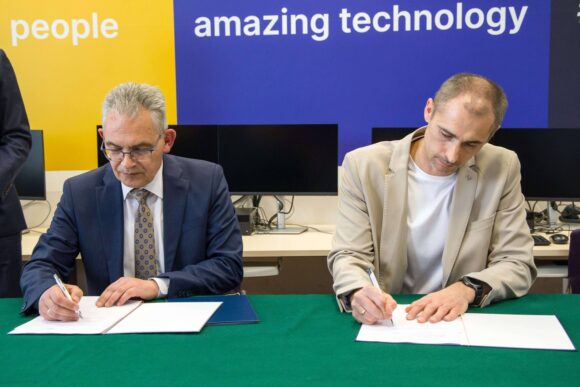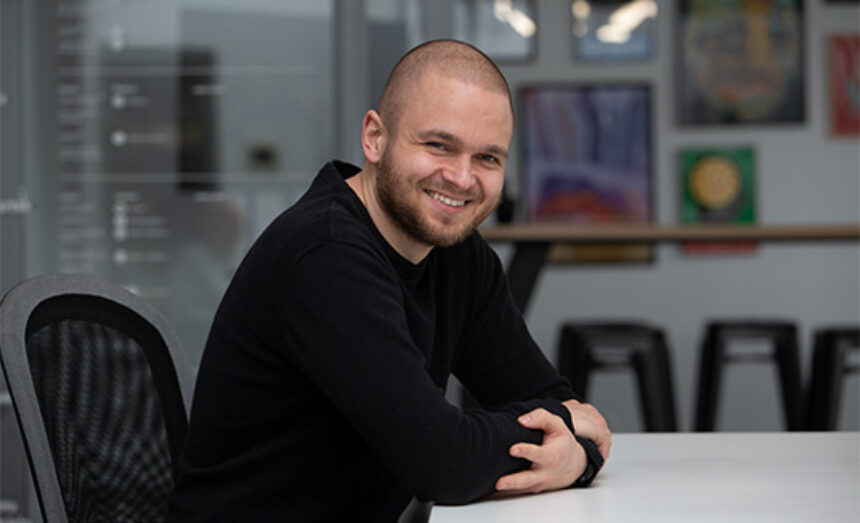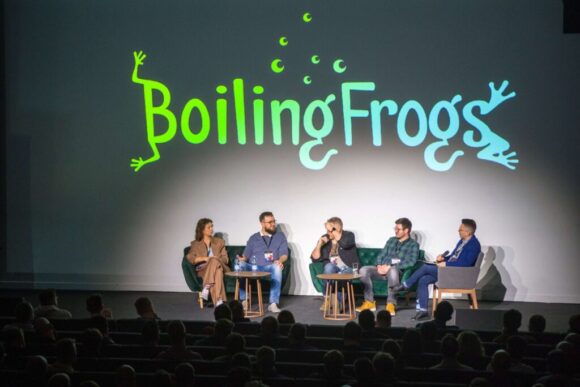
How to choose a position to suit your own competences? An interview with Tomek

Tomek has been with us for two years, but eight months ago he entered a completely new career path. From data analysis, he moved to a position related to building relationships with couriers and developing our products. Read an interview between Tomek and Kasia, our Human Resources specialist, and learn how to take care of your own career development and what to do when the current position ceases to bring professional fulfillment.
Tomek, let’s start from the beginning. Tell us how your adventure with Metapack began. What experience did you have when you joined us?
My experience, despite my young age, was quite rich. I dealt with various things. Starting with working as an English language teacher (because that’s what I’m educated to do that’s what I’d beed doing for five years), through work in direct sales and customer support departments, to the enormous amount of experience I have gained while running a sports team in Zielona Góra. I think that thanks to all these activities, I gained advantages that were noticed in the company.
I will keep reapiting that despite the fact that the adventure with our football club was only volunteering, it gave me a huge baggage of various opportunities and knowledge on business topics. A sports club is a kind of a product that needs to be developed and it just so happened that almost from the beginning of this adventure I was involved in it. So I had a complete picture of how to get started, make this product fully functional and almost maintenance free.
We know what gave you a good start, tell us which skills or competences helped you the most in your job as a requirements analyst?
The position of a Requirements Analyst demands a very wide range of skills, so there were probably few that I could use at the beginning of my work (laughs). However, speaking quite seriously, it seems to me that the most helpful was the ability to notice certain problems that may arise, but are not visible yet. The ability to talk to people – this is definitely a huge plus that I have learned from my previous experiences. There are quite a lot of requirements from couriers or customers, and you need to be able to extract the appropriate information. These aspects were definitely important and I could transfer them from my previous experience. Such an analytical ability to approach a problem and the ability to contact another person.
You have joined the Requirements Analyst team. What did you like the most about this job?
I will not be original in my answers here – it was the contact with our clients. I appreciate the possibility of using my language skills which I have tried to cultivate for several years of my life. It was extremely important to me. In addition, I also appreciated the possibility of learning ours and other systems, which allowed me to feel much more confident than before joining the company.
Nevertheless, there was a thought to change your career path. When did it sprout? Where did the idea to go towards Engagement Manager come from?
These thoughts appeared when we lost a person who was dealing with similar problems for couriers with whom I cooperated, i.e. smaller couriers. I knew that such a spot had to be filled and this was when those first thoughts appeared. However, not having fully documented experience with the tasks that may arise in the EM position and after reviewing the offer that we received internally, I didn’t think that this was the moment when I should try.
So I thought about it, and as I am also a person who tries not to suppress ideas that are spinning somewhere in my head, I asked for a meeting with my boss, Piotr, to discuss with him possible career paths for me. The position of a Requirements Analyst did not fully meet my professional needs and I felt it was a good time for a change. I knew that I was ready and able to do other things, a bit more distant from the analysis itself, and focused more on business contacts with couriers.
So I asked for such a meeting and it certainly helped me a lot to with deciding whether to apply for the EM position at all. During the conversation with Piotrek, I heard information that, above all, made me convinced that this direction would be the right one for me.
You believed in your abilities, you gave it a try. Tell me, what was the recruitment for this position like?
Recruitment consisted of a few meetings with Beata, conversations with her, information about the vision of this position from the company’s perspective, because at that moment it was a completely new role created in the courier team. Of course, we have Engagement Managers in the Professional Services department, but their responsibilities are slightly different there. So we first had to discuss what this position should look like, what this person should do and how I see it. I expected my duties to be very fluid for the first few months. We also talked about my expectations, about Beata’s expectations about how we both see this position, and I think it worked.
It definitely worked, the recruitment is now over, and you have began your new job. Tell me what your first days, first months in this position looked like. What was your onboarding like?
I started with a break because I had already planned trips for my holidays and it was too late to cancel anything, so for the first three weeks of my new job as an EM I was very happy (laughs). However, after returning, at the end of August, we started the onboarding process. It was not the typical onboarding I experienced when coming to Metapack, because it was a vacation period and a lot of people, who could take part in this process, were unavailable. However, there were also topics that were extremely important and my presence was needed from the very first moment.
There were also trainings regarding the new system that we are to introduce in some time, so the onboarding process itself was highly condensed, I would say. And the second issue, which I mentioned earlier, was that at the beginning we were still settling the duties and tasks of the EM in the courier team. So it was difficult to plan such a full onboarding as in the case of other departments and positions that have been operating in our company for years. For me, it was not a problem, no obstacle, because from the very beginning this was settled between me and Beata.
Now let’s decode that magical job title that causes so many problems for so many people. Tomek, Engagement Manager. What is this role? What are you really doing here, what are you getting involved in?
I’ll answer with a joke again – I’m a person who arranges weddings, engagements. I am here to meet the needs of our couriers as much as possible and involve them in the further development of our cooperation. I am a bit of an Account Manager for nearly 200 couriers, but also a person responsible for business processes with these couriers, for preparing offers, for supervising their topics on our side. This is what I am involved in, this courier cooperation, I am their contact in our company. I make sure that everything is implemented on time, I try to hasten certain topics, change the prioritization a bit. In short, I keep an eye on everything related to courier work.
This is a role in which, evidently, contacts with people are very important and you deal with all kinds of stakeholders. You run into different roles in companies, with partners we work with, but also with different cultures because we operate globally. Tell me what is the most difficult for you and if at all you find anything difficult in such contacts.
Honestly, it’s hard for me to find any problems in this regard. As I mentioned before, I have a lot of experience in this field – I think and I feel so. These are different companies, from different places in the world and you have to be aware that it requires working with different cultures as well, you have to be ready for this. However, this is also not a problem for me. I know more or less how to work with the British and how to work with people from the Middle East, for example. I think it’s a matter of the experience I already have.
The actual duties, from what I hear, did not surprise you. This shows that the internal recruitment process was well adjusted and the expectations of the candidate and the company were consistent. Tell me what, then, is the most difficult thing in this role, what are the challenges you face.
The most difficult thing is probably that our entire company is a large organization and in fact we have many different channels on which we communicate internally. My position requires cooperation with a huge number of people, each of whom has a different style of work, different expectations and habits, and it certainly causes some kind of difficulties. Again, these are the difficulties I had anticipated. Everyone is probably aware that since we have several hundred employees, not everything will be beautiful and perfect. However, this is the biggest drawback for me, that in fact there is a huge amount of these dependencies inside the company – between us, between teams from Great Britain and other countries.
How would you describe your typical working day?
Coffee, tea (laughs). The typical day of my work is checking emails from the previous day, to which I was not able to answer. There is a lot of that for sure. You also have to take into account several meetings, over four a day. Four, six, eight, with couriers or internal, regarding courier issues. In addition, it’s preparing, updating, analyzing documentation for the courier or from the courier, if such needs arise. Checking the progress of work for topics that are relevant at the moment and whether something is moving or not, whather you already have to put out a small fire somewhere so that it does not spread further. In addition, there’s a typical job of dealing with couriers, to check if something is happening or if they need something.
Taking into account the market we operate in, i.e. e-commerce, can you say that your role is driven by some seasonality? Are there times when you have much more work to do followed by relatively calm periods?
Yes, I think so. As for us, this seasonality is visible during the holidays or the sales period in November, then I certainly feel the intensified amount of work that is necessary to do. On the other hand, yes, there were times when in fact there was a little less work. I think it was most visible after Christmas.
This was related to the holidays that follow the New Year, preparations of budgets in companies or accepting last year’s expenses, but it can be safely said that there is much more to do now.
As you probably know, the role of the Engagement Manager in each company may be a bit different. Considering your role in Metapack, can you say that you manage a specific portfolio of clients, couriers that you deal with?
Definitely yes. My role is mainly focused on working with the ‘small couriers’, so to speak, which are couriers we do not treat as our diamond group with an annual volume of more than a few million. Anything that doesn’t fit in this group is my client’s portfolio. As I mentioned earlier, there are about 200 of them. However, smaller couriers also have much smaller needs, lower requirements, lower expectations. We’re talking about 100 couriers who are in contact with us.
A hundred still seems large. Tell me how difficult it is to navigate between job priorities for these specific couriers.
When it comes to prioritizing work, we have some guidelines that we use. With this in mind, I don’t feel that this process is extremely difficult, but you know, we are not able to satisfy everyone 100% and this is my role to try and make this work in the best possible way, despite time lags that happen.
You are a representative of the company, you work for success, goals you set for yourself, but on the other hand you are also the couriers’ attorney. How do you deal with setting boundaries, because as you mentioned before, you have the skills, you build relationships very well, so there are probably many who say: ‘Tomek, maybe we can do something faster, maybe you could move somthing forward?’.
I always try to see if we are able to do something differently, approach the problem in such a way that our couriers’ expectations are met a bit faster. So I never assume that there’s nothing we can do. However, after checking it and making sure that we can’t postpone anything in any way, I try to always be straight with our couriers. I present this problem to them in such a way as to show that it’s not entirely up to us, that it also depends on other aspects. It was brought in too late, it’s a hot season, and so on.
Nevertheless, I try to check our possibilities, because even postponing the tasks by a week or two already builds a nice relationship with the courier, it shows that we are trying. Despite the fact that perhaps the expectation was to move something two months earlier, and we managed to save only two weeks. It still shows our proactive approach to problems and it’s received very positively.
It seems that assertiveness is also an equally important competence in your position. How do you deal with it or what would you advise to people who are still working on assertiveness, because it is one of the most difficult competences to develop?
Definitely, yes. We see this also internally that people sometimes let others walk over them. How to develop assertiveness? First of all, bear in mind that we have a specific framework for our positions, specific duties and tasks that the company sets for us. Everyone wants to help the other person as much as possible, put aside their tasks sometimes, but you have to keep in mind that we still have some work to do and we should focus on it. If something goes far beyond our responsibilities, then you have to say ‘no, I can’t, not now, let’s try later, try with another person’. It is extremely difficult to develop such a skill, but it is also a matter of practice.
I remembered one more interesting question, which I often hear. EM and PM? People often ask about this. What is the actual difference between an Engagement Manager and a Project Manager? What’s your view?
I’ve never been a PM, so it’s hard for me to answer this question (laughs). However, seriously speaking, PM is definitely a person who deals with a specific project and the most important thing for them is that it’s successful. So that there are no time shifts, that everything is in line with the budget, with the hours, that all the right people are involved in the right way.
I think that EM’s responsibilities are a bit wider. I don’t deal with specific projects for individual clients. I don’t get a project, manage it, finish, get another one, and so on. The job of a EM is a little more fluid and a little more constant. Fluid in the sense that we don’t just manage one topic, we take care of the whole relationship with couriers, and constant because these relationships are built for years.
Finally, I would like to ask you what would you recommend to people who are still hesitating on whether to change their career path?
I would certainly suggest openness. Openness in conversations with superiors. I have the impression that we as a society, are still afraid of such open conversations about the fact that we see ourselves in a different position, that maybe our current duties bore us a bit or aren’t that interesting, that we see potential elsewhere. Despite everything, I believe, and my story shows it, that it’s worth taking up such a topic with your supervisor. I certainly wouldn’t suggest doing something behind the leader’s back, because it will never turn out well. It’s better to talk openly.
For some time I thought about a different career path, but the conversation with Piotrek opened my eyes a bit. He told me that he saw a completely different path for me and at today I am extremely grateful for that. It’s definitely worth being open. If there is something that interests us, where we see ourselves, let’s go, talk, let’s see. The conversation doesn’t cost anything, no one will certainly be offended that we undertake such a conversation, because I don’t think we have such people in the company. So go ahead and try. Because if there is a job that a given person wants to do, then why not? I think my story shows that you can be very happy with the changes.
So to sum up, it’s worth talking.
Definitely. It’s not worth keeping the thoughts about your career to yourself.
The more that there are such opportunities and it’s a pity not to take advantage of them. Thank you, Tomek, for the interview.
Thank you.
